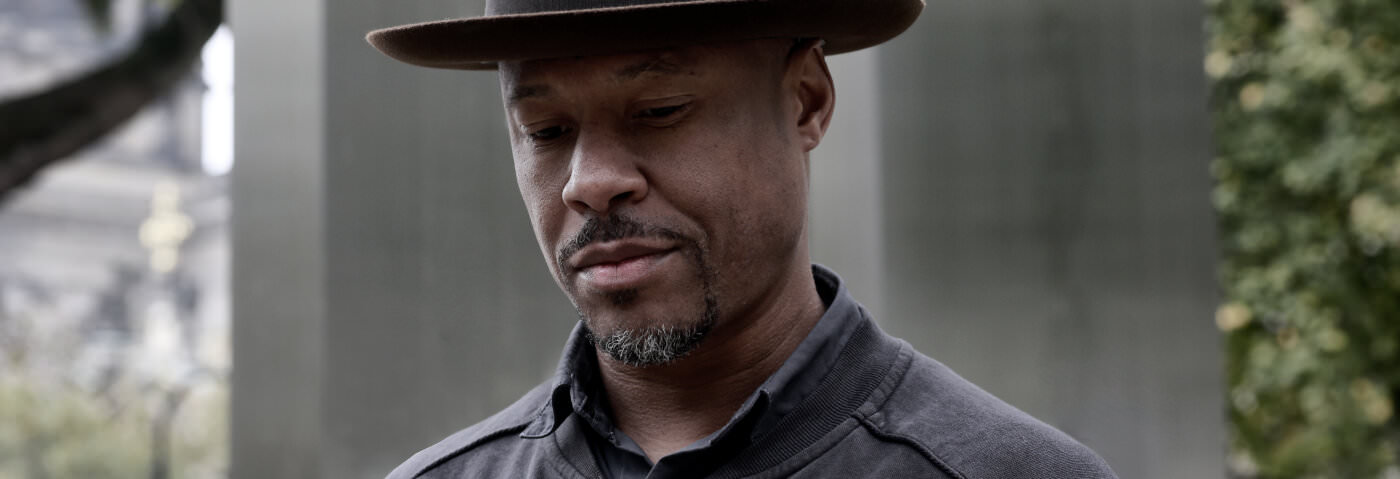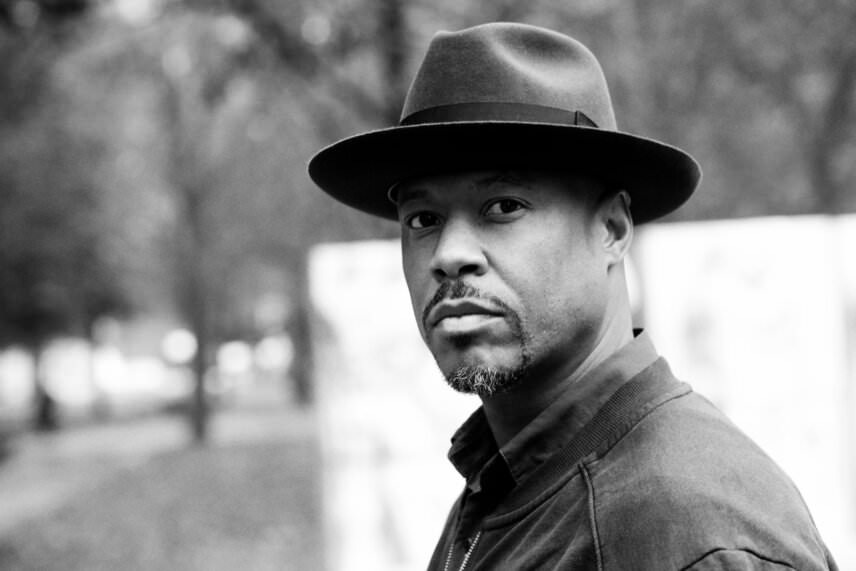Robert Hood’s ‘Mirror Man’ album drops later this month on Rekids. We spoke with the Detroit techno legend about the role of techno as protest music and about making the machines bleed.
Robert Hood is one of techno’s most consistent producers who over the course of his three-decades-long career has continually delivered pure, authentic and forward-looking music. He’s a true techno originator and over the years has more than proved his underground credentials: founding member of Underground Resistance and innovator of minimal techno, with a peerless back catalogue of releases under his own name and many pseudonyms including Monobox, Inner Sanctum, The Vision, Hood Scientific, The Mathmatic Assassins, not to mention as H&M with Jeff Mills, Missing Channel with Claude Young and, since 2016, in partnership with his daughter Lyric Hood in his Floorplan project.



Hood is back with a killer album for 2020, the raw, intricate electronic delights of ‘Mirror Man’, easily a contender for techno album of the year. Speaking to us from his home in Alabama, Robert Hood has a warm tone, a captivating way with words and a charismatic approach to speaking, no doubt all traits that have stood him in good stead in his career as an ordained minister, and traits that make interviewing him an absolute pleasure. We began by talking about Hood’s new album ‘Mirror Man’.
Attack Magazine: So now that it’s finished and released, what do you feel about ‘Mirror Man’?
Robert Hood: “I feel like it started out as a study in self-reflection, sort of at myself looking in the mirror and examining myself, taking stock, and asking myself where are you and do you like what you see in the mirror? Not physically but spiritually, looking into the mirror, into my own heart and examing and reflecting on where I’ve been, where I am and where I’m going. The album, after January started to morph into or evolve into this reflection of not only myself but also the world and the state of where we are – and the growing spread of hate.
The hate is growing as if it were a pandemic. You know, we’ve got covid 19 but we’ve also got this growing manifestation of white supremacy and hate in this country. So I was just examining through the looking glass for where we are as a people.
It’s about me laying hands on these machines and humanising them, much in the same way that J Dilla did
Do you think that Techno has a role to play in the fight against white supremacy?
Being an artist and having a platform to say something like referencing Curtis Mayfield and Marvin Gaye, yeah, we have a responsibility to use our voice, to raise a black fist you know, or just to raise up a fist against injustice anywhere, as Martin Luther King said injustice anywhere is a threat to justice everywhere and so we have to look at that and say as a representative of electronic music, which mostly is instrumental, I’m going to use my platform and my sound to raise up that fist. And figure out a way with the speech with Tamika Mallory [Black Lives Matter activist whose speech Robert used on his Floorplan release from earlier this year ‘The Struggle‘] to say ‘enough is enough’. I’m going to speak my mind about these racial disparities and these feelings and fight against it, and that’s the best way I know how to fight, through my music. I consider myself a Colin Kaepernick and take cues from [civil rights activists] Medgar Evers from Sonia Sanchez and say something with my voice.
So I definitely feel a responsibility, sort of like what Chuck D and Public Enemy is doing now or Nas – I cannot keep quiet anymore. I’ve felt an obligation personally for quite some time, since Trayvon Martin’s murder, and with the murders of George Floyd, Brianna Taylor, Ahmaud Arbery, Philando Castile, it’s been this nation has poured salt on our wounds. We’re still hurting from events that happened during the civil rights movement and here we are in the year 2020, still feeling the pain of our ancestors swinging from ropes. When I saw that video of that officer’s knee on George Floyd neck, we feel that knee on all our necks: so we have to say something.
Can you tell us a bit about how you use your music to communicate about these issues?
The screams and the cries of Black people from Detroit, from Alabama, from the UK, from Africa, we feel that. The migrant coming from South America to the US border, and even to Europe, I feel that in my spirit, in my soul. Our soul is crying out for humanity to be compassionate and so it’s imperative that my music reflect that.
I don’t think I would make music or feel the need to express myself musically, artistically and creatively without those elements. It’s like when an interviewer asked James Brown “`What is soul?” and James Brown used the word “can’t”. Because when you’ve been told as a Black man or woman that you can’t go here, can’t do this, can’t do that because you’re Black, your soul cries out. Because you’re being restricted you’re being held back and treated less than and told that you are less than. So I feel the pain of those chains, being restricted like on a slave ship coming from Africa, you can’t move, you can’t turn, you’re just bound, and chained and it’s about breaking those chains.
That’s the aesthetic that goes into me handling a synthesiser, I’m going to approach it like Prince holding a guitar, I’m going to master this thing, it’s not going to have mastery over me
How do you go about articulating that through machine/electronic music?
The circuitry in a sampler or synthesiser, the elements that went into the making of a synthesiser, a sampler, a drum machine, they came from were created by God. And so I can touch this machine with the anointing of God, and pray over these machines and say I’m going to need to you to speak what I want you to speak. I’m going to programme you and the robotic element that’s in these machines is going to have to fall in line with the anointing of God. It’s about me laying hands on these machines and humanising them, much in the same way that J Dilla did.
J Dilla would take an MPC and humanise that thing and own it, not allow the robotic dimensions of it control him, he had mastery over that machine. That’s what it’s about, it’s about mastery, much in the same way that Stevie Wonder mastered the harmonica or clavinet or Donnie Hathaway mastered the Fender Rhodes. That’s the aesthetic that goes into me handling a synthesiser, I’m going to approach it like Prince holding a guitar, I’m going to master this thing, it’s not going to have mastery over me.
I remember growing up in an era where a lot of cats in Detroit would get musical instruments in let’s say the bootleg way (!) you know what I mean… but I never had the money when guys would come around with these ill-gotten instruments, so the machines I had were pawnshop instruments, like for one hundred dollars or so and I would have to make it talk, make it say what I wanted it to say. I just used to learn whatever I had, and I had very little, especially when I was making ‘Minimal Nation‘. When I was working on the H&M tracks for Axis I had very little to work with, but I had to make it work. So I had to make it bleed – basically give that machine a heart.
Techno’s come a long way since those early days in Detroit and maybe a young kid in Europe might not really know all those connections back through electro, disco and further back. Do you feel that as Techno has gone global it’s been removed from its roots?
In a way, but you know, I’ve always been concerned about it. Back in the days of rave culture, I noticed that it became more about the samples and the hype than the soul and the soul was always just so important to me, it was imperative that I inject soul into it. You know, coming from the Motown ear, and being a 70s kid and growing up on Parliament-Funkadelic and Barry White and David Bowie and so much soulful music, I didn’t want my music to lose any of that feeling, that soul. Electronic music for me shouldn’t be stiff and cold and robotic and so lifeless and for me, Kraftwerk, Soul Sonic Force and producers like John Robie, they kept the soul of let’s say the African drum in it.
It was important for me to use those elements to communicate like an African drum from village to village so that’s another way I approached music and minimalism: to focus on the African drum, the hi-hat and that ride cymbal and the bassline to speak and to sing and to somehow play a melody without playing a melody. So it’s not always an easy thing to do, with just one little Japanese groove box but it was important that I keep that legacy alive.
That to me was so much more progressive than trying to grab the latest piece of technology and thinking that’s going to propel me and compel the listener to stay engaged. For me, it’s the heart speaking to another heart that’s gonna keep the listener engaged. It’s not about the equipment that you have, it’s so easy to get caught up in that and use that robotic element to keep the listener engaged but at the end of the day, it’s about who you are and what you do with whatever you have.
Robert Hood – ‘Mirror Man‘ is released November 20th on Rekids.
Photos by Marie Staggart

